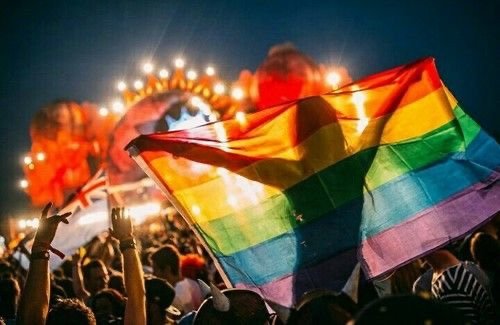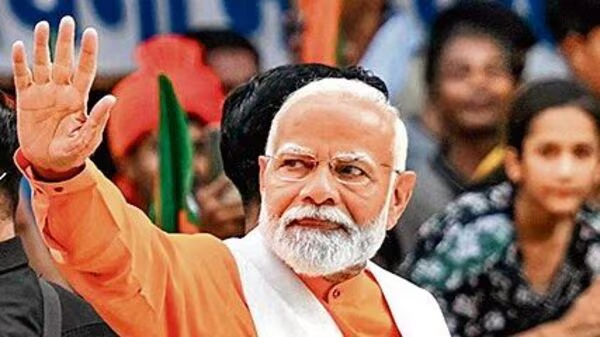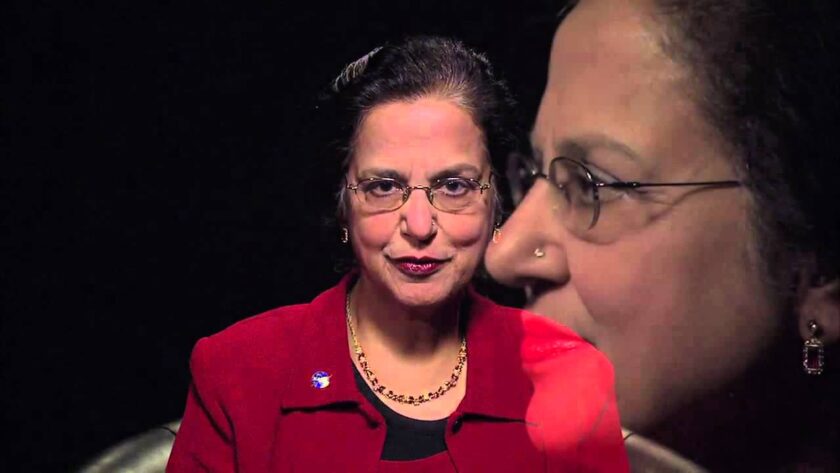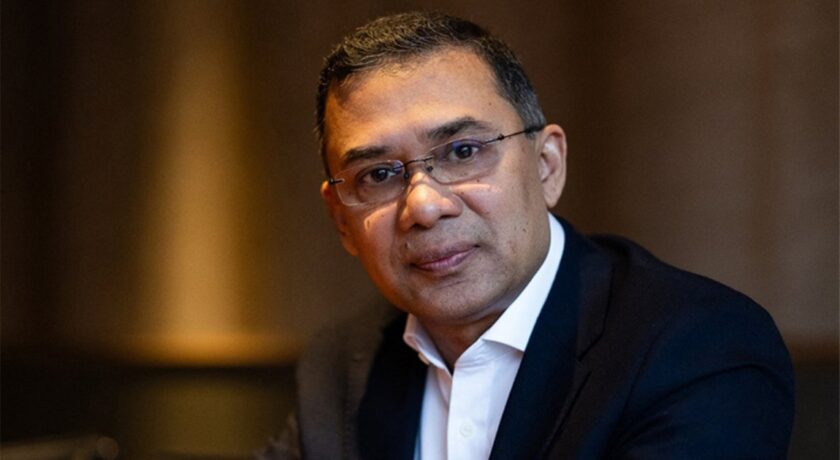Shreya Mundhra / Firstpost
Bangkok: Thailand is set to become the first Southeast Asian country to legalise same-sex marriages. But what about the rest of Asia? What is the status of marriage among LGBTQ+ couples here? How do people view such unions? We explain
Thailand is all set to approve same-sex marriage after lawmakers approved a marriage equality bill. This is a first in Southeast Asia. But what about the rest of Asia? What is the status of marriage among LGBTQ+ couples here? How do people view such unions? We explain.
Thailand’s legislative journey toward marriage equality
Thailand has long been known for its relatively open and accepting attitude towards the LGBTQ+ community compared to its regional neighbors. The push for marriage equality gained significant momentum in recent years, culminating in a major legislative milestone in 2024.
The bill’s passage underscores Thailand’s status as a relative haven for gay couples in Asia. It marks a significant victory for LGBTQ+ rights advocates who have campaigned tirelessly for years. The legislation not only allows same-sex couples to marry but also grants them the same legal rights and protections as heterosexual couples, including inheritance rights, tax benefits, and adoption rights.
- Taiwan
Taiwan made history on May 17, 2019, by becoming the first place in Asia to legalize same-sex marriage. The Legislative Yuan passed the “Enforcement Act of the Judicial Yuan Interpretation No. 748,” granting same-sex couples the right to marry legally. This law was a landmark achievement for LGBTQ+ rights in Asia, following a 2017 constitutional court ruling that denying same-sex couples the right to marry was unconstitutional.Under the new law, same-sex couples are granted many of the same rights and obligations as opposite-sex couples. However, the legislation falls short of full marriage equality in some areas, such as adoption rights. While same-sex couples can adopt the biological children of their partners, they are not permitted to jointly adopt non-biological children, a right available to opposite-sex married couples. - **Nepal
**Nepal has taken significant steps towards recognizing same-sex marriages, although it has not yet enacted comprehensive legislation. In 2007, Nepal’s Supreme Court directed the government to draft laws to protect LGBTQ+ rights, including the legalization of same-sex marriage. Despite this directive, the legislative process has been slow.In March 2023, the Supreme Court ordered the government to recognize the marriage of a same-sex couple who had married in Germany. This ruling was followed by a significant development in November 2023, when authorities in Dordi, a municipality in Lamjung district, legally recognized the marriage of Maya Gurung, a transgender woman legally recognized as male, and Surendra Pandey, a cisgender man. This was the first instance of a municipality in Nepal registering a same-sex marriage as per the Supreme Court’s directive, marking a critical step towards broader recognition of same-sex marriages in the country.
In India, a near miss
India came close to legalizing same-sex marriage in 2023 but ultimately did not. The Supreme Court of India declined to grant legal recognition to same-sex marriages, stating that it was within the domain of the parliament to introduce such legislation.

While the ruling acknowledged the rights of gay couples, allowing them to engage in relationships without fear of legal repercussions, same-sex marriages remain illegal. This means that LGBTQ+ individuals in India still face significant legal challenges, especially concerning family matters like inheritance, succession, and hospital visitation rights.
The status of same-sex marriage across Asia
Public opinion on same-sex marriage varies significantly across Asia. According to a Pew Research Center survey conducted between June 2022 and September 2023, attitudes towards same-sex marriage are deeply divided.
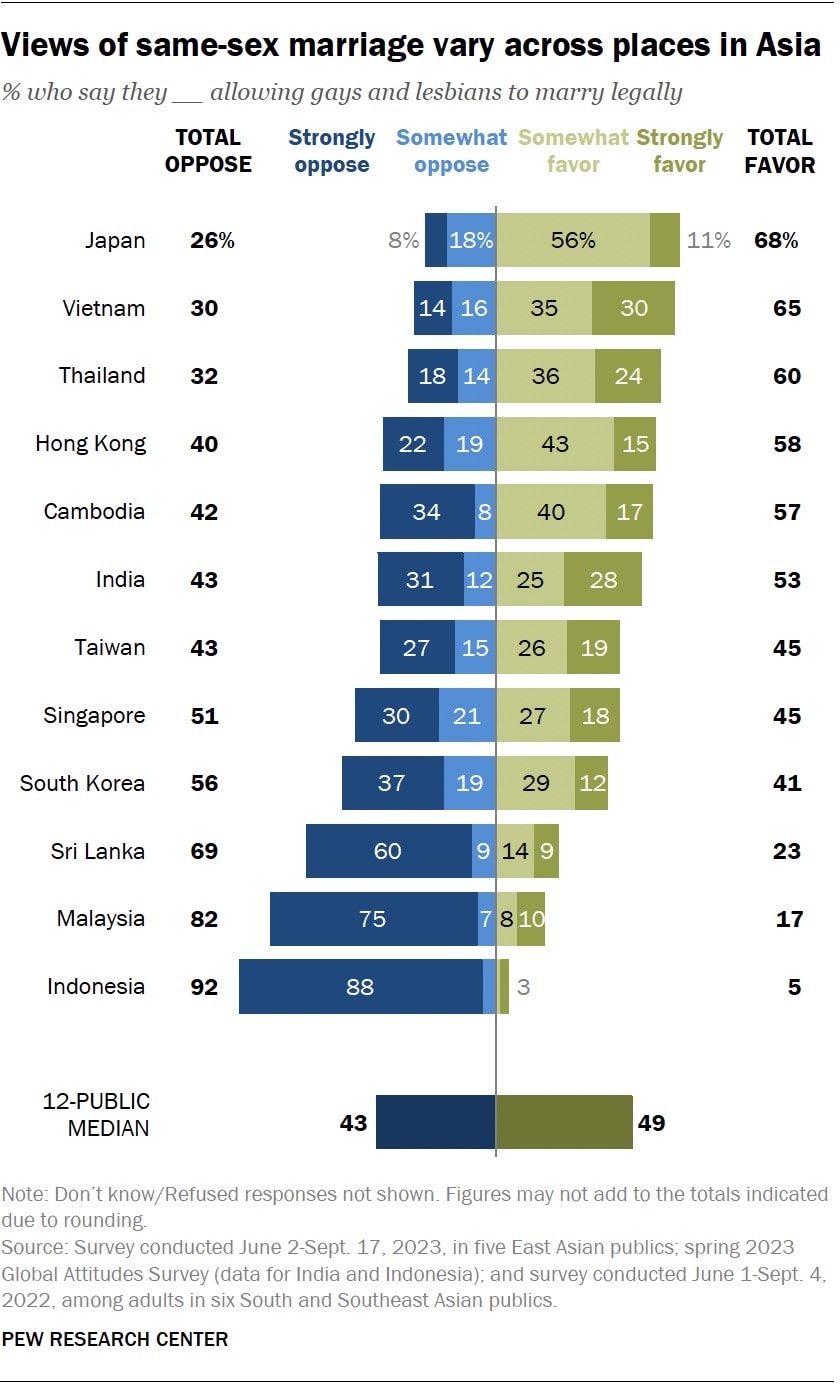
- Japan: Japan has the highest level of support for same-sex marriage in Asia, with 68% of adults favoring its legalization. Despite this support, Japan remains the only G7 country that does not legally recognize same-sex couples.
- Vietnam: In Vietnam, 65 per cent of adults supported legalising same-sex marriage. While the country has made significant strides in LGBTQ+ rights, same-sex marriage remains illegal.
- Hong Kong: Approximately 58 per cent of adults in Hong Kong support same-sex marriage. A recent court ruling granted same-sex couples equal inheritance rights, though they still cannot marry legally.
- Cambodia: Cambodia also shows considerable support, with 57 per cent of adults favoring same-sex marriage. However, there has been little legislative movement towards legalisation.
- Singapore: Opinions are nearly split in Singapore, with 45 per cent supporting and 51 per cent opposing same-sex marriage. The Singaporean parliament recently amended the constitution to prevent legal challenges to the definition of marriage as between a man and a woman.
- Indonesia: Indonesia has one of the highest levels of opposition to same-sex marriage, with 92 per cent of adults against it. The country recently criminalised extramarital sex, which further complicates the legal landscape for LGBTQ+ individuals.
- Malaysia and Sri Lanka: Both countries have significant majorities opposing same-sex marriage, with 82 per cent in Malaysia and 69 per cent in Sri Lanka against it.
- South Korea: In South Korea, a slight majority (56 per cent) oppose same-sex marriage, while 41 per cent support it. A same-sex marriage bill was proposed in the South Korean parliament earlier this year but has yet to gain significant traction.
Generational divide
Across most Asian countries, younger adults are more likely to support same-sex marriage than their older counterparts. This generational divide is most pronounced in Taiwan, where 75 per cent of adults under 35 favor same-sex marriage, compared to 33 per cent of those aged 35 and older. This trend suggests a potential shift in public opinion in the coming years as younger, more progressive generations become more politically active.
Legal and social challenges
Despite growing support in some areas, same-sex marriage remains a contentious issue across much of Asia. In several countries, homosexuality itself is criminalised, further complicating the push for marriage equality. For instance, in Indonesia and Brunei, laws criminalise gay sex, with Brunei even prescribing death by stoning (although executions have been put on hold following international outcry).






